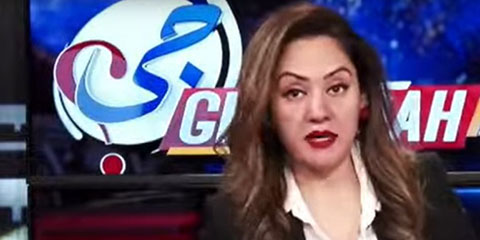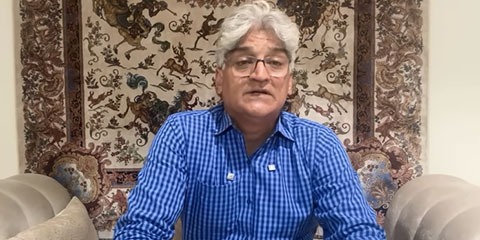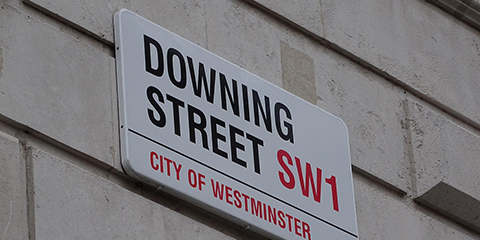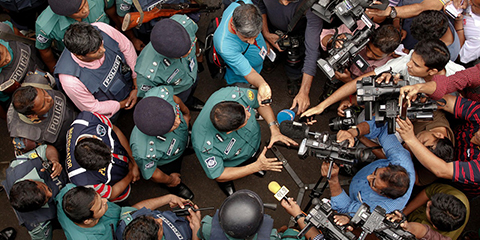Pakistan's 'invisible hands' strike again: Two more journalists muzzled
JournalismPakistan.com | Published 9 months ago | JP Special Report
Join our WhatsApp channel
ISLAMABAD—In a troubling escalation of Pakistan's ongoing media crackdown, two more prominent television personalities have been forced off the air, adding to the growing list of journalists silenced by what many describe as the country's "invisible hands."
Habib Akram of Suno TV and Khalid Jamil of ABN News both recently announced departures from their respective programs under circumstances that, while officially unexplained, follow a disturbing pattern of media suppression in the country.
Akram, host of "Suno Habib Akram Kay Sath," cryptically stated on X (formerly Twitter) that he would be "stepping away from my program on Suno TV for an indefinite period" due to "unavoidable and unspeakable reasons." Similarly, Jamil announced his departure from his program "Debate @ 8" on ABN News, directing viewers to follow his content on YouTube instead.
A Systematic Pattern of Intimidation
These latest cases emerge in the wake of the controversial Prevention of Electronic Crimes Act (PECA) Amendment, hastily passed by the Senate in late January, which critics argue provides legal cover for suppressing journalistic freedom and political dissent.
The silencing of these voices is part of a troubling trend. Earlier this month, ARY News anchor Kashif Abbasi was taken off the air under the pretense of a leave period after highlighting a PATTAN report criticizing the controversial 2024 elections. According to insider sources, Abbasi refused to accept conditions that would have prevented him from criticizing Punjab Chief Minister Maryam Nawaz and her party, the Pakistan Muslim League-Nawaz (PML-N). "His searing questions did not go down well with the powers that be, who subsequently pressured the management to remove him from the air," revealed a source familiar with the situation.
A Long History of Media Control
Pakistan's record of media intimidation extends back years. In May 2021, Geo News removed Pakistan's most popular anchor, Hamid Mir, from the airwaves after he criticized the establishment during a protest supporting tortured journalist Asad Toor. This marked the second time Mir's program "Capital Talk" faced a ban, with the first occurring during President Pervez Musharraf's era.
More recently, in October 2024, GNN TV anchor Samina Pasha was compelled to resign due to pressure from unnamed sources displeased with her political analysis. Pasha claimed she was presented with two options: change her stance or leave her position. She chose the latter to maintain her journalistic integrity.
Perhaps most concerning is the case of Sami Ibrahim, a well-known anchor who has reportedly remained unemployed for months. Ibrahim alleges he is effectively blacklisted across all television channels, stating: "Wherever I tried to secure a job, the channel was warned it would face the same fate as BOL News."
The Consequences of Silence
The systematic targeting of journalists who question powerful interests represents a significant threat not only to press freedom but to Pakistan's democratic foundations. When journalists are prevented from holding power to account, corruption and abuse flourish unchecked.
The increasingly common practice of forcing journalists off mainstream platforms and onto less regulated spaces like YouTube or social media creates a fragmented information landscape where verified facts compete with disinformation and propaganda.
Moreover, the climate of fear created by these targeted removals leads to self-censorship among remaining journalists, who must weigh professional integrity against personal safety and job security. The result is a media environment that increasingly serves as a mouthpiece for those in power rather than as the public watchdog it's meant to be.
A Call for Action
As Pakistan continues its troubling slide down global press freedom indexes, the international community must increase pressure on Pakistani authorities to respect journalistic independence. Media organizations within the country must also stand in solidarity rather than allowing themselves to be picked off one by one.
Most importantly, the Pakistani public deserves to know when their information sources are being manipulated and controlled. Only through awareness and resistance can the cycle of intimidation be broken and a truly free press be restored.
Until then, the silencing of voices like Akram and Jamil stands as a stark reminder of how fragile press freedom remains in Pakistan, and how determined certain forces are to control the national narrative—no matter the cost to democratic principles or public discourse.

























